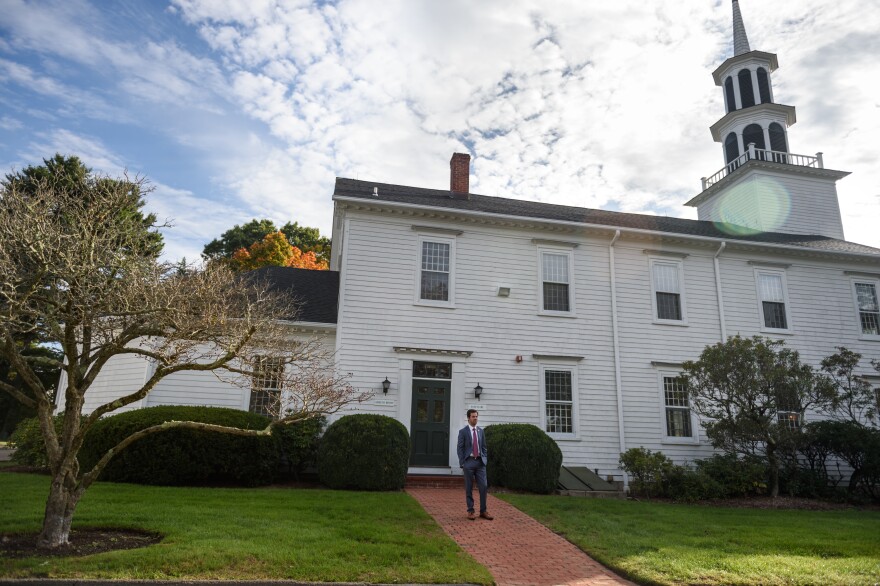Editor's note: This story contains a description of self-harm.
For an estimated 500,000 veterans, being put out of the military with an other than honorable discharge is a source of shame and an obstacle to employment. "Bad paper," in most cases, means no benefits or health care from the Department of Veterans Affairs — even when the problems that got them kicked out were linked to PTSD, traumatic brain injury or military sexual assault.
But last month, Connecticut opened state VA resources to vets who can show that one of those conditions is linked to their discharge. For veterans like Thomas Burke, now a youth minister at Norfield Congregational Church, it's part of a long path to recovery.
"When I first started looking for jobs, I did not want to be a youth minister to kids, because my PTSD stems from a traumatic event where I failed children," says Burke.
Burke did two combat deployments with the Marine Corps within the space of one year. After a rough tour in Iraq, he found himself in southern Afghanistan, based in a tiny village, living close to civilians. Burke had been trained in the local language, and he connected with the village kids. In one photo, Burke is in combat gear, playing with 15 laughing boys on a dusty road. He says local boys helped out — they would tell them where IEDs were. He grew to love them and they loved him back.
"They'd bring us bombs," he says. "On one of those occasions they were bringing us [a rocket-propelled grenade], and it ended up exploding on them."
When Burke heard the blast, he and other Marines rushed out to find eight of the kids from that photo dead.
That sent him into a spiral — the local hashish was plentiful and many soldiers used it. Burke started smoking heavily and got caught.
Suddenly a promising young Marine was getting kicked out with an other than honorable discharge — a sort of scarlet letter for a veteran, which many say is worse than never having served at all.
Burke was flown to his home base in Hawaii, where a mix of prescriptions and street drugs made things worse. Then, he flew back home.
"I took a plane to Connecticut and slit my wrists in a state park," he says.


Veterans with an other than honorable discharge have higher rates of suicide. They're at higher risk of homelessness. Mental health issues can snowball with economic ones: When employers ask about military service, they also ask about discharge status — so for job prospects, it is worse than never having served.
"These individuals up till now were denied clinical support services and other programs and benefits, and we believe in many cases may have resulted in a worsening of their conditions," says Thomas Saadi, Connecticut's commissioner for veterans affairs.
Saadi says it makes both moral and practical sense to help these vets before they're in crisis. And that's what Connecticut is now doing, thanks in part to the efforts of veterans like Burke.
After Burke's failed suicide attempt, the VA made a rare exception, and he was able to get services. He started down a different path — to become a pastor.
And he joined a push to change the law around other than honorable discharge. He found allies in the state Legislature, like Republican Rep. Brian Ohler, also a combat vet.
"When we testified before the Veterans Affairs Committee, [Thomas] and I were sitting right next to each other," says Ohler. "And I said the only difference between Thomas and I is a piece of paper — one that says honorable discharge and the other that says other than honorable."
It took years of lobbying, but as of last month, Connecticut veterans whose other than honorable discharge is linked to PTSD, brain injury or sexual assault will qualify for state health care and benefits, including tuition to state schools.
The national VA is changing too — earlier this year Sen. Chris Murphy, D-Conn., pushed through legislation that makes VA mental health care available nationwide to veterans with other than honorable discharges, though it has been slow to roll out.

For Burke, helping get recognition and treatment for other bad-paper vets has been part of feeling whole again. When he hears kids laughing, it still triggers memories of Afghanistan, but he can smile through them now.
"The opportunity to work with children fills me with the spirit and life and joy in a way that I can't even explain, because it also makes me recognize how far I've come from the person who got back from war," says Burke.
Copyright 2023 NPR. To see more, visit https://www.npr.org.



